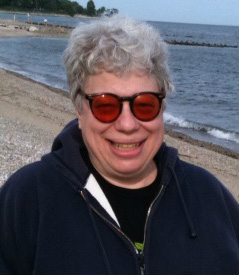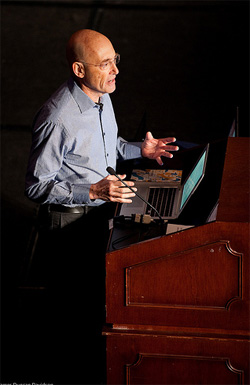Publishing Talks: David Wilk interviews Deborah Emin
August 16, 2010 by David
Filed under Ebooks and Digital Publishing, PublishingTalks, The Future
 In this series of interviews, called Publishing Talks, I have been talking to book industry professionals about the future of publishing, books, and culture. This is a period of disruption and change for all media businesses. How will publishing evolve as our culture is affected by technology, climate change, population density, and the ebb and flow of civilization and its economics?
In this series of interviews, called Publishing Talks, I have been talking to book industry professionals about the future of publishing, books, and culture. This is a period of disruption and change for all media businesses. How will publishing evolve as our culture is affected by technology, climate change, population density, and the ebb and flow of civilization and its economics?
I hope these Publishing Talks conversations will help us understand the outlines of what is happening, and how we might ourselves interact with and influence the future of publishing as it unfolds.
These interviews give people in the book business a chance to talk openly about ideas and concerns that are often only talked about “around the water cooler,” at industry conventions and events, and in emails between friends and they give people inside and outside the book industry a chance to hear first hand some of the most interesting and challenging thoughts, ideas and concepts being discussed by people in the book business.
I learned about Deborah Emin from an article about Sullivan Street Press and her “throwback” program called the Itinerant Book Show. Deborah and colleagues (they call themselves “bookies”) travel to towns in the midwest as far as Iowa bringing books they select to events in art galleries, bars, coffee shops and the like. Because they are featuring only books they have read and liked, it’s pretty easy to understand how they are connecting successfully with audiences. And as she points out on the Sullivan Street website, the real key is what Deborah as a publisher and writer can learn about audiences. Face to face, one to one. It’s invaluable intelligence for anyone concerned with understanding how a literary community works.
All of this resonates for me. Her story reminded me of work some of us were doing more than thirty years ago, bringing books by new authors and publishers to booksellers and audiences around the country. In the late 1970’s what was then called the Coordinating Council of Literary Magazines (still going strong and known as CLMP) sponsored a number of grassroots efforts to bring independently published poets and writers into bookstores, which involved personal visits to bookstores, libraries, schools and even bars to sell books.
There were programs in North Dakota (where a budding young writer named Louise Erdrich interned), Rochester, NY, Minneapolis-St. Paul (where I was) and other locales, all sharing a commitment to connecting innovative new writers to new audiences, sometimes, one person at a time. Many then young publishers still publishing today, were introduced to their audiences through those early efforts.
So is everything old new again? I think the spirit of independent publishing continues. Writers find their readers, and readers their books one at a time, after all. The magic of literary discovery still requires the kind of personal effort that Deborah Emin and the Itinerant Book Show put forth. Which is also the kind of personal connection forged by booksellers with their customers. Whether the books are printed by hand on custom paper using handpresses, or created digitally using HTML or ePub, learning about a book you will love is ultimately about a deep connection between the writer, and the reader, with one or more intermediaries making the hand off.
Sullivan Street Press consists of Deborah Emin, an editor and writer, Ron Lebow, a computer technologist, a business development professional and also a writer. It’s a pretty interesting and obviously fertile group of minds and talents. The work they are doing is challenging and rewarding, and offers valuable lessons for publishers of any size and ambition.
Podcast: Play in new window | Download
Publishing Talks: David Wilk Interviews Adam Hodgkin
August 2, 2010 by David
Filed under Ebooks and Digital Publishing, PublishingTalks, Technology, The Future
 In this series of interviews, called Publishing Talks, I have been talking to book industry professionals about the future of publishing, books, and culture. This is a period of disruption and change for all media businesses. How will publishing evolve as our culture is affected by technology, climate change, population density, and the ebb and flow of civilization and its economics?
In this series of interviews, called Publishing Talks, I have been talking to book industry professionals about the future of publishing, books, and culture. This is a period of disruption and change for all media businesses. How will publishing evolve as our culture is affected by technology, climate change, population density, and the ebb and flow of civilization and its economics?
I hope these Publishing Talks conversations will help us understand the outlines of what is happening, and how we might ourselves interact with and influence the future of publishing as it unfolds.
These interviews give people in the book business a chance to talk openly about ideas and concerns that are often only talked about “around the water cooler,” at industry conventions and events, and in emails between friends and they give people inside and outside the book industry a chance to hear first hand some of the most interesting and challenging thoughts, ideas and concepts being discussed by people in the book business.
Adam Hodgkin is one of the three publishing and technology experienced founders of Exact Editions, which started as a digital publishing solution for magazines to run on the iPhone (and of course now on the iPad as well). Exact Editions enables magazine publishers to sell “in-app” subscriptions, and notably, preserves the notion of the designed page, something that has been a concern for many publishers of illustrated books as well. I’ve been reading the Exact Editions blog for some time and have been impressed with Adam’s understanding of the emerging digital publishing universe. Something he wrote recently caught my attention immediately, as I have long been interested in the ways that authors, publishers and readers will learn to connect with one another in the online environment. Here’s what Adam wrote about the Apple environment upon which EE is built:
“The Apple e-commerce system works extremely well in my view and with the freemium method that we are adopting at Exact Editions it works in a way in which the ratios between ‘sampling’ and ‘purchasing’ are extremely informative. And as we get more data and get on top of it and learn how to do SRO (SampleRevisionOptimisation – a bit like SEO and it will be an equally dark art) the business of presenting the right amount of content to optimise sales will be established. We currently recommend working at about 8-15% exposure, but its guesstimatory at this point. Amazon must know quite a lot about this from their system, but I am not sure if they have issued any guidance to publishers.
The Apple system is better than most physical bookshops because it can put ‘samples’ in the hands of thousands (many thousands) of potential subscribers/purchasers much more efficiently than can be done with printed paper pages. The economics of this are pretty compelling even if the ‘sample’ to ‘purchase’ ratio is as low as 1%. And in most cases its quite a bit higher than that.
Will probably blog something a bit more informative about this in the next few days. But just let me say that I am simply ASTONISHED by how much more takeup there is for the iPad than for the iPhone. More in absolute terms, by quite a margin, even though there are maybe 40X as many iPhone/IPod touches in the market than iPads.
The iPad is turning out to be a hugely strong reading environment. Absolutely no question about it. And its darn easy to buy stuff on it that you might want to read.”
I thought it would be interesting to talk to Adam about Exact Editions and some of the things he and his colleagues have learned through the experience of working in the Apple environment, not only with magazine publishers but now as they are expanding into working with book publishers as well. My discussion with Adam covered his background and experience in traditional publishing, technology, and some of the lessons learned by the Exact Editions team in their work in digital publishing apps and proved to be as compelling as I had expected.
Podcast: Play in new window | Download
Publishing Talks: David Wilk interviews Bob Stein
July 18, 2010 by David
Filed under Ebooks and Digital Publishing, PublishingTalks, Technology, The Future
 In this series of interviews, called Publishing Talks, I have been talking to book industry professionals about the future of publishing, books, and culture. This is a period of disruption and change for all media businesses. How will publishing evolve as our culture is affected by technology, climate change, population density, and the ebb and flow of civilization and its economics?
In this series of interviews, called Publishing Talks, I have been talking to book industry professionals about the future of publishing, books, and culture. This is a period of disruption and change for all media businesses. How will publishing evolve as our culture is affected by technology, climate change, population density, and the ebb and flow of civilization and its economics?
I hope these Publishing Talks conversations will help us understand the outlines of what is happening, and how we might ourselves interact with and influence the future of publishing as it unfolds.
These interviews give people in the book business a chance to talk openly about ideas and concerns that are often only talked about “around the water cooler,” at industry conventions and events, and in emails between friends and they give people inside and outside the book industry a chance to hear first hand some of the most interesting and challenging thoughts, ideas and concepts being discussed by people in the book business.
Bob Stein is for me one of the great visionary innovators and someone I greatly admire. He most recently co-founded The Institute for the Future of the Book, which quite modestly describes itself as “a small think-and-do tank investigating the evolution of intellectual discourse as it shifts from printed pages to networked screens. We are funded generously by the MacArthur Foundation, and affiliated with the University of Southern California. We are located in Brooklyn, NY and London, UK.” Bob’s bio includes founding the excellent Criterion Collection of classic films, which he ran for 13 years, as well as The Voyager Company, which produced more than 75 innovative multi-media projects in CD-ROM formats. Subsequently, Stein started Night Kitchen to develop authoring tools for the next generation of electronic publishing. That work is now being continued at the Institute for the Future of the Book.
In our conversation Bob talked a bit about his background and his history of working in publishing as lead in to a wide ranging discussion of digital publishing issues. Bob’s vision of how reading and books work in the digital, networked social environment – “books as conversation” as well as or perhaps instead of “books as objects” – and how authors and readers interact in the emerging environment is compelling. Bob has a deep experience that combines conceptual and hands-on work on so many of the issues that concern anyone interested in books and reading which for me makes his point of view so important to experience.
Podcast: Play in new window | Download
Publishing Talks: David Wilk interviews Eoin Purcell
May 21, 2010 by David
Filed under Ebooks and Digital Publishing, PublishingTalks, Technology, The Future
 In this series of interviews, called Publishing Talks, I have been talking to book industry professionals about the future of publishing, books, and culture. This is a period of disruption and change for all media businesses. How will publishing evolve as our culture is affected by technology, climate change, population density, and the ebb and flow of civilization and its economics? Publishing Talks interviews help us understand the outlines of what is happening, and how we might ourselves interact with and influence the future of publishing as it unfolds.
In this series of interviews, called Publishing Talks, I have been talking to book industry professionals about the future of publishing, books, and culture. This is a period of disruption and change for all media businesses. How will publishing evolve as our culture is affected by technology, climate change, population density, and the ebb and flow of civilization and its economics? Publishing Talks interviews help us understand the outlines of what is happening, and how we might ourselves interact with and influence the future of publishing as it unfolds.
These interviews give people in the book business a chance to talk openly about ideas and concerns that are often only talked about “around the water cooler,” at industry conventions and events, and in emails between friends. I believe these interviews give people inside and outside the book industry a chance to hear first hand some of the most interesting and challenging thoughts, ideas and concepts being discussed within the industry.
Eoin Purcell works and lives in Dublin, Ireland. He is a publishing industry analyst and commentator. He runs Green Lamp Media, a publishing and publishing services company and also edits Irish Publishing News.
He has worked as Commissioning Editor with one of Ireland’s oldest independent publishers Mercier Press and at Nonsuch Ireland (now The History Press Ireland). He writes occasional blog posts and columns on the Irish book trade for The Bookseller magazine.
I was prompted to talk to Eoin by his persuasive and cogent article that appeared in (Ed Nawotka’s highly recommended online newsletter) Publishing Perspectives called “E-Books are a Cul-de-sac: Why Publishing Needs to Rethink its Digital Strategy.” In my view, Eoin consistently thinks and writes clearly about the unfolding future of a digital publishing future. In this conversation we talked mainly about how publishers (and authors) can and must adapt to the emerging environment created by new technology (and new distribution models), including practical ideas and actions they can take to embrace new tools and methods of reaching readers in a profitable way. He expressed his view that publishers need to focus on longer term trends, the values they can provide to readers (and writers) and then build their businesses around identifiable communities of readers. We also talked about the differences in marketing paradigms that digital publishing establishes for publishers, the idea of “publishing as community” and much more.
Eoin provides a fresh, incisive perspective along with realistic ideas and strategies for publishers who want to embrace a new paradigm of publishing based on a web-centric environment. I think this conversation will be valuable to anyone (publisher or author) who is interested in creating a successful digital strategy for the long term future.
Podcast: Play in new window | Download
Publishing Talks: David Wilk Interviews Margo Baldwin
April 25, 2010 by David
Filed under Ebooks and Digital Publishing, Publishing History, PublishingTalks, The Future
 In this series of interviews, called Publishing Talks, I have been talking to book industry professionals about the future of publishing, books, and culture. This is a period of disruption and change for all media businesses.
In this series of interviews, called Publishing Talks, I have been talking to book industry professionals about the future of publishing, books, and culture. This is a period of disruption and change for all media businesses.
How will publishing evolve as our culture is affected by technology, climate change, population density, and the ebb and flow of civilization and its economics? Publishing Talks interviews help us understand the outlines of what is happening, and how we might ourselves interact with and influence the future of publishing as it unfolds.
These interviews give people in the book business a chance to talk openly about ideas and concerns that are often only talked about “around the water cooler,” at industry conventions and events, and in emails between friends. I believe these interviews give people inside and outside the book industry a chance to hear first hand some of the most interesting and challenging thoughts, ideas and concepts being discussed within the industry.
Margo Baldwin is the co-founder of Chelsea Green Press, an outstanding and fiercely independent publisher now based in White River Junction, Vermont. We’ve known each other a long time, and over the years, we’ve had opportunities to talk about publishing and politics on many different levels, so this interview is really a continuation of that ongoing conversation about books and ideas, and the role independent publishing can play in making real social change. Chelsea Green’s work extends far beyond the books it publishes, to blogs, websites, video, political movements, and community involvement. The company’s 2003 mission statement is a powerful – and sobering – expression of what a socially engaged publisher might be in the 21st century.
“Indeed, one begins to wonder what “living” really means or will come to mean in the opening decade of the twenty-first century. Can anything be deemed sustainable when life itself–in all its myriad forms–is threatened at so many levels? Is it enough to focus on the how-to of ‘green living’ in the face of such overwhelming force, the ‘shock and awe’ of forest and ecosystem destruction, the rampant plundering of the world’s oceans, the terror of GMO-contaminated-food, and the unintended consequences of biotechnology? We wish to move the company forward boldly and with a new sense of urgency. While continuing our commitment to remain at the forefront of information about green building, organic growing, and renewable energy – the practical aspects of sustainability – we will also publish for a new politics of sustainability, for the cultural resistance that living demands of us now.”
In our Publishing Talks conversation, Margo talks about the history of Chelsea Green, where it is today, and where her vision of publishing will lead the company in the future as it tries to carry out its bold and important mission. The recently announced partnership between Chelsea Green and Vermont’s Northshire Books is a great example of the creative thinking that Margo and her company are practicing.
Podcast: Play in new window | Download
Publishing Talks: David Wilk Interviews Don Linn
March 23, 2010 by David
Filed under Ebooks and Digital Publishing, PublishingTalks
 In this series of interviews, called Publishing Talks, I have been talking to book industry professionals, each of whom has a different perspective about the future of publishing, books, and culture. This is a period of disruption and change for all media businesses.
Publishing has been a crucial part of human culture for as long as people have been writing and reading.
In this series of interviews, called Publishing Talks, I have been talking to book industry professionals, each of whom has a different perspective about the future of publishing, books, and culture. This is a period of disruption and change for all media businesses.
Publishing has been a crucial part of human culture for as long as people have been writing and reading.
How will publishing evolve as our culture is affected by technology, climate change, population density, and the ebb and flow of civilization and its economics? Publishing Talks interviews help us understand the outlines of what is happening, and how we might ourselves interact with and influence the future of publishing as it unfolds. Publishing Talks interviews give people in the book business a chance to talk about ideas and concerns in a public forum that are often only talked about “around the water cooler,” at industry conventions and events, and in emails between friends.
I believe that these interviews give people inside and outside the book industry a chance to hear first hand some of the most interesting and challenging thoughts, ideas and concepts that are currently being discussed within the industry.
I’ve know Don Linn for a number of years, dating back to when he took over the then beleaguered Consortium Book Sales & Distribution, the very excellent but financially challenged distributor of independent literary publishers based in St. Paul, Minnesota. At that point Don took on the very tough job of running a stand-alone book distribution business at a time of great flux in the book business, and did a very fine job of it, by all accounts, finally selling Consortium to the much larger Perseus Books, where it and its many outstanding publisher clients have found safe haven. Don later went on to be publisher at Taunton Books in Newtown, Connecticut, and now has joined the ranks of the independent publishing professional. He’s blogging too, his Mississippi roots showing, at Bait ‘n’ Beer which is both entertaining and edifying.
Here’s his current bio: “Don has a sordid past as an investment banker, cotton and catfish farmer, book distributor, publisher, entrepreneur and general ne’er-do-well. He’s a graduate of Harvard Business School and Vanderbilt University and is endlessly fascinated by books and publishing and their collision with technology. Among other things.”
Don’s intelligence and wit are on display in our talk. His business background and love of books, publishing and the people in the business provide him with a really interesting perspective, and it’s clear he has been thinking hard about the book business and where it is going. He wrote a terrific report on the recent O’Reilly Tools of Change that attracted my attention, and led to this conversation about where publishing is headed in the emerging digital distribution environment. I think his views and opinions will be valuable to publishers of all sizes.
Podcast: Play in new window | Download
